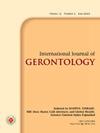台湾老年卵巢癌患者患病轨迹之生活经验:现象学研究
IF 0.3
4区 医学
Q4 GERIATRICS & GERONTOLOGY
引用次数: 1
摘要
背景:老年卵巢癌患者对癌症诊断和治疗有复杂的情绪反应,如对日常生活的担忧。随着癌症治疗的进展,这些患者需要家庭、社区和卫生保健专业人员的支持,以应对身体和心理症状和损伤。方法:采用Giorgi现象学方法,探讨老年患者在卵巢癌病程中的生活体验本质。结果:共进行了15次访谈。从逐字记录中出现了4个主题和10个副主题:(1)对健康丧失的绝望:治疗副作用超出预期,对能量丧失的担忧阻碍了与癌症的斗争,以及日常活动和人际关系的中断;(2)努力为生命而战:乐观和难以建立新的人生观,并配合规定的治疗;(3)管理不确定性:意识到生命的无常,抓住当下,反思生命的意义,努力恢复身体健康;(4)学会面对早逝:感知即将到来的生命终结,为持久的爱寻求内心的平静。结论:卵巢癌的低治愈率使老年患者面临死亡的可能。医疗团队必须提供紧急和长期的医疗护理,重视老年卵巢癌患者的医疗自主权,提供及时的专业意见和充分的护理。医务人员应通过整合社会资源,帮助患者制定适应策略,建立支持系统,实现患者的整体福祉。本文章由计算机程序翻译,如有差异,请以英文原文为准。
Lived Experiences in the Illness Trajectory for Elderly Patients with Ovarian Cancer in Taiwan: A Phenomenological Study
Background: Elderly patients with ovarian cancer have complex emotional responses to the cancer diagnosis and treatment such as worry about performing daily routines. As cancer treatment progress, these patients need support from family, community, and health care professionals to cope with physical and psychological symptoms and impairments. Methods: Giorgi's phenomenological methodology was employed to explore the essence for elderly patients' lived experiences amid the illness trajectory of ovarian cancer. Results: Fifteen interviews were conducted. Four themes and 10 subthemes emerged from the verbatim transcripts: (1) hopelessness regarding loss of health: treatment side effects exceed expectations, worries about loss of energy hindering the cancer battle, and interruption of daily activities and interpersonal relationships; (2) endeavoring to fight for life: optimism and difficulty in establishing a new perspective on life, and cooperation with prescribed treatment; (3) managing uncertainty: realizing the impermanence of life and seizing the moment, self-reflection on the meaning of life, and attempting to regain physical health; and (4) learning to face early death: perceiving the upcoming end of life, and seeking peace of mind for lasting love. Conclusion: The low cure rate of ovarian cancer forces elderly patients to face the possibility of death. Medical teams must provide urgent and long-term medical care and value the medical autonomy of elderly patients with ovarian cancer to offer timely professional opinions and adequate care. Medical professionals should help patients develop adjustment strategies and establish a support system by integrating social resources for the holistic well-being of the patient.
求助全文
通过发布文献求助,成功后即可免费获取论文全文。
去求助
来源期刊
CiteScore
0.60
自引率
0.00%
发文量
0
审稿时长
6-12 weeks
期刊介绍:
The Journal aims to publish original research and review papers on all fields of geriatrics and gerontology, including those dealing with critical care and emergency medicine.
The IJGE aims to explore and clarify the medical science and philosophy in all fields of geriatrics and gerontology, including those in the emergency and critical care medicine. The IJGE is determined not only to be a professional journal in gerontology, but also a leading source of information for the developing field of geriatric emergency and critical care medicine. It is a pioneer in Asia.
Topics in the IJGE cover the advancement of diagnosis and management in urgent, serious and chronic intractable diseases in later life, preventive medicine, long-term care of disability, ethical issues in the diseased elderly and biochemistry, cell biology, endocrinology, molecular biology, pharmacology, physiology and protein chemistry involving diseases associated with age. We did not limit the territory to only critical or emergency condition inasmuch as chronic diseases are frequently brought about by inappropriate management of acute problems.

 求助内容:
求助内容: 应助结果提醒方式:
应助结果提醒方式:


